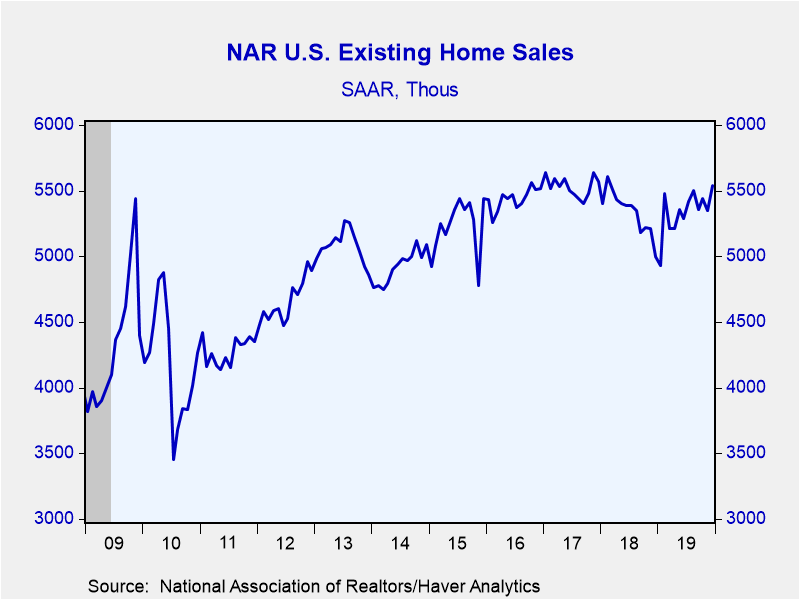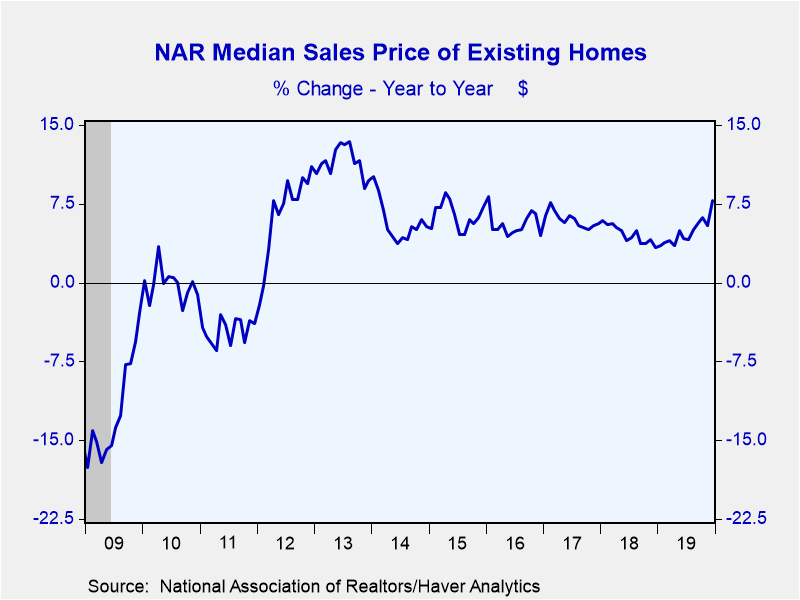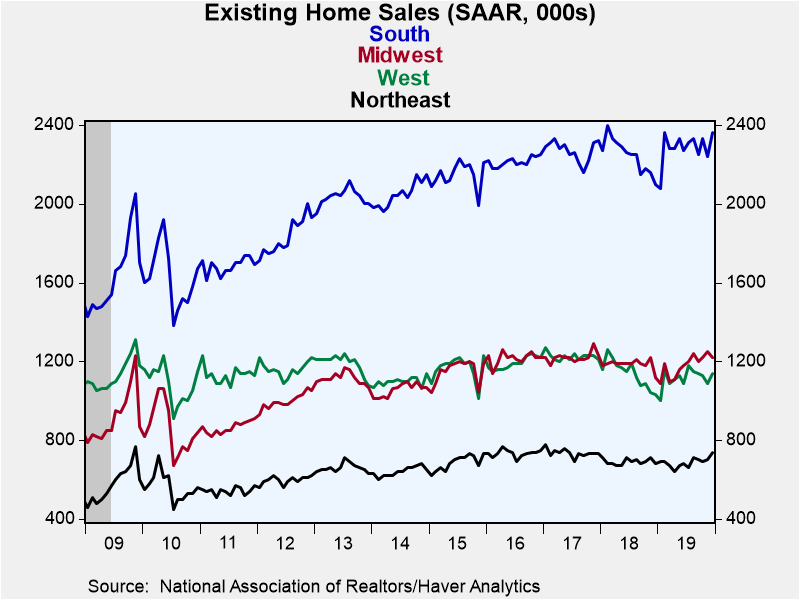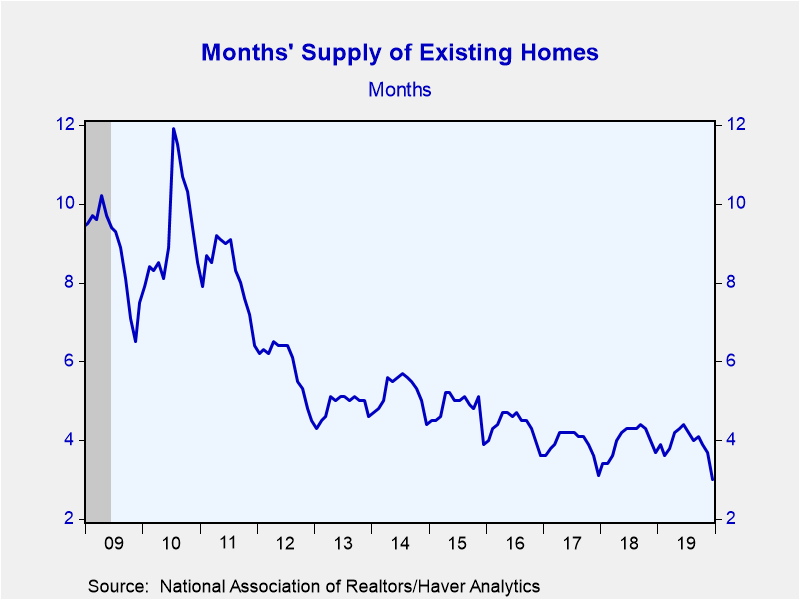 Global| Jan 22 2020
Global| Jan 22 2020U.S. Existing Home Sales & Prices Strengthen
by:Tom Moeller
|in:Economy in Brief
Summary
The National Association of Realtors (NAR) reported that sales of existing homes during December increased 3.6% (10.8% y/y) to 5.540 million (SAAR) after falling to an unrevised 5.350 million in November. During all of 2019, existing [...]
The National Association of Realtors (NAR) reported that sales of existing homes during December increased 3.6% (10.8% y/y) to 5.540 million (SAAR) after falling to an unrevised 5.350 million in November. During all of 2019, existing home sales held steady y/y at 5.341 million units. That was below the 2017 peak of 5.531 million. The Action Economics Forecast Survey expected December sales of 5.43 million. The home sales figure date back to 1999.
The median price of all existing homes sold increased 1.2% (7.8% y/y) to $274,500. The average sales price rose 1.0% (5.9% y/y) last month to $311,200. These price data are not seasonally adjusted.
Existing home sales were mixed around the country in December. In the South, sales rose 5.4% (12.4 y/y) to a near-record 2.360 million after falling 3.9% in November. Sales in the Northeast gained 5.7% (8.8% y/y) to 740,000 and added to the prior month's increase. In the West, sales rose 4.6% (10.7% y/y) 1.140 million following four straight months of decline. To the downside, home sales in the Midwest declined 1.5% (+9.2% y/y) to 1.300 million after two months of strong increase.
Sales of existing single-family homes increased 2.7% (10.6% y/y) to 4.920 million units after falling 1.2% in November. Sales of condos and co-ops surged 10.7% (12.7% y/y) to 620,000 units, the highest level since June 2018.
The number of homes on the market declined 8.5% y/y during December to a record low. The months' supply of homes on the market also decreased m/m to a record low 3.0 from 3.7 twelve months earlier. These inventory figures date back to 1999.
The data on existing home sales, prices and affordability are compiled by the National Association of Realtors and can be found in Haver's USECON database. The regional price, affordability and inventory data are available in the REALTOR database. The expectations figure is from the Action Economics Forecast Survey, reported in the AS1REPNA database.
Do Monetary Policy Announcements Shift Household Expectations? from the Federal Reserve Bank of Dallas can be found here.
| Existing Home Sales (SAAR, 000s) | Dec | Nov | Oct | Dec Y/Y % | 2019 | 2018 | 2017 |
|---|---|---|---|---|---|---|---|
| Total Sales | 5,540 | 5,350 | 5,440 | 10.8 | 5,341 | 5,341 | 5,531 |
| Northeast | 740 | 700 | 690 | 8.8 | 687 | 689 | 735 |
| Midwest | 1,300 | 1,320 | 1,290 | 9.2 | 1,252 | 1,265 | 1,301 |
| South | 2,360 | 2,240 | 2,330 | 12.4 | 2,285 | 2,246 | 2,270 |
| West | 1,140 | 1,090 | 1,130 | 10.7 | 1,118 | 1,141 | 1,225 |
| Single-Family Sales | 4,920 | 4,790 | 4,850 | 10.6 | 4,760 | 4,742 | 4,907 |
| Median Price Total ($, NSA) | 274,500 | 271,300 | 271,000 | 7.8 | 269,758 | 257,267 | 245,950 |
Tom Moeller
AuthorMore in Author Profile »Prior to joining Haver Analytics in 2000, Mr. Moeller worked as the Economist at Chancellor Capital Management from 1985 to 1999. There, he developed comprehensive economic forecasts and interpreted economic data for equity and fixed income portfolio managers. Also at Chancellor, Mr. Moeller worked as an equity analyst and was responsible for researching and rating companies in the economically sensitive automobile and housing industries for investment in Chancellor’s equity portfolio. Prior to joining Chancellor, Mr. Moeller was an Economist at Citibank from 1979 to 1984. He also analyzed pricing behavior in the metals industry for the Council on Wage and Price Stability in Washington, D.C. In 1999, Mr. Moeller received the award for most accurate forecast from the Forecasters' Club of New York. From 1990 to 1992 he was President of the New York Association for Business Economists. Mr. Moeller earned an M.B.A. in Finance from Fordham University, where he graduated in 1987. He holds a Bachelor of Arts in Economics from George Washington University.
More Economy in Brief
 Global| Feb 05 2026
Global| Feb 05 2026Charts of the Week: Balanced Policy, Resilient Data and AI Narratives
by:Andrew Cates










